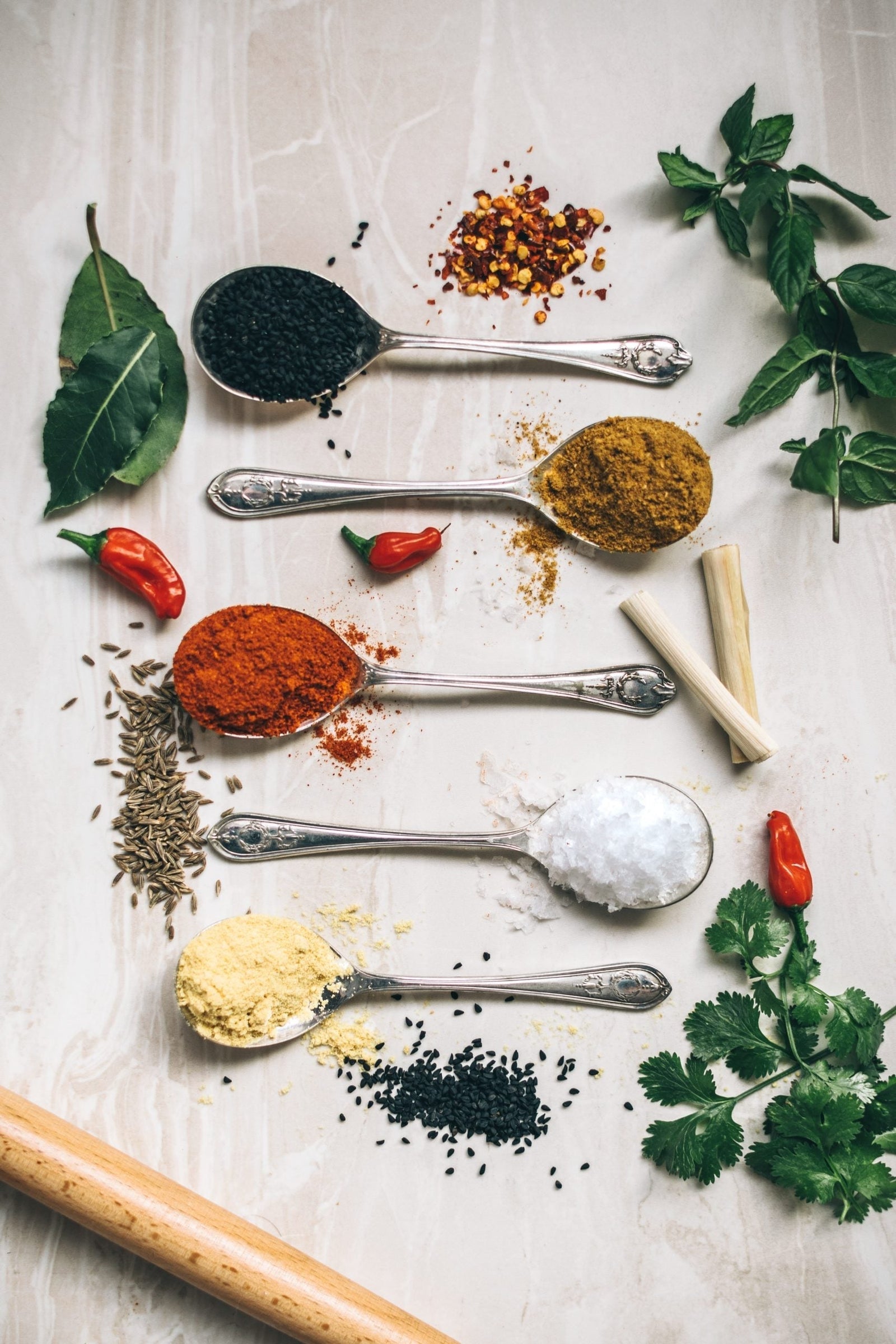11 Ways To Rebuild And Support Your HCL Levels

It’s been said that “we are what we eat”, and that is true - to a point! A more accurate term would be “we are what we eat, digest and absorb from our food”. When our digestion is healthy and strong, we break down and absorb all the precious nutrients from our foods. However, if our digestion is impaired we miss out on those key nutrients, even from the best, nutrient-dense foods.
Hydrochloric acid (HCL), also known as stomach acid, plays a vital role in this process of breaking down nutrients for proper absorption. If we have enough HCL, then our digestive system can do its job seamlessly and beautifully!
Sadly, many people today (including children) are unknowingly deficient in HCL. Known medically as “hypochlorhydria”, a lack of HCL is due to things like too much processed foods, certain medications, stress, chronic illness, undiagnosed infections, nutrients deficiencies and antibiotic use which disrupts the microbiome.
The good news is, you can safely test your HCL levels at home and take steps to increase your stomach acid naturally!
Note: if you have an ulcer or suspect one, it’s best to consult with your doctor or healthcare practitioner.
Signs You Don’t Have Enough Hydrochloric Acid
One of the reasons chronic digestive health issues are rampant is that we have misunderstood our bodies’ cries for help. For example, if you experience heartburn you’ve probably been told you have “too much” stomach acid. However, research has shown that heartburn can be an indication of a lack of stomach acid, especially in the elderly.
Other symptoms of low stomach acid can include:
- Anemia
- Adult acne, rosacea
- Indigestion
- Candida or fungal overgrowth
- Cramps
- Chronic yeast infections
- Dilated capillaries on cheeks
- SIBO (small intestinal bacterial overgrowth)
- Feeling overly full after a meal
- Symptoms of gastritis (belchin, flatulence, nausea, stomach pain which can radiate to the back, burning sensation in upper abdomen)
- Weakness
- Nutrient deficiencies
- Brittle nails
- Fatigue
- Stomach pain
- Undigested food in stool
- Inability to digest protein/protein deficiency
- GI infections
I have also observed in clients that cravings and a high tolerance for sour foods such as citrus, sauerkraut and grapefruit juice can indicate too little HCL. If you do not like acidic foods, then you may have too much HCL. This varies person to person, but is worth noting.
As you can see, the list of symptoms is vast and revealing… especially if you’ve been unable to figure out why you have random ailments like adult acne, low iron, or brittle nails for example. It could be as simple as a lack of hydrochloric acid and there are plenty of ways to increase your levels!
Two Ways To Test Hydrochloric Acid Levels At Home
There are two different ways to test your hydrochloric acid levels. You can ask your doctor for a diagnostic test or do an at-home test. While an at-home test is not diagnostic, it will indicate whether you’re low or high on the HCL spectrum.
Important notes:
- If you’ve been diagnosed with an ulcer, stop here and do not do any of the following tests. It is best to consult your doctor or healthcare practitioner.
- If you have a stomach ache, try the lemon juice test first.
- If you do not have a stomach ache, or if your pain does not increase after the lemon juice test, then try the HCL test. It requires an HCL supplement, which you can find at most health food stores or online. We personally use and recommend Premier Research Lab's Betaine HCL.
Option 1: Lemon Juice Test
- When you have stomach pain, take a tablespoon of lemon juice. If the pain stops, you may have too little stomach acid. If it makes your symptoms worse, then you may have too much stomach acid.
- If your pain increased after the lemon juice test above, do not do the HCL test below. You could have an ulcer or too much stomach acid.
Option 2: Betaine HCL Test
- Take one capsule of Betaine HCL before the last mouthful of a main meal (a complex meal that contains protein and fat, not with a simple meal of mostly carbohydrates, such as salad, soup, or fruit).
- Burning or indigestion after taking one capsule means you have plenty of hydrochloric acid or you have a stomach ulcer (see note below). Don't take any more.
- If no burning occurs, proceed to the next step to determine how much supplemental HCL you need.
Note: If you have a peptic ulcer, do not supplement with Betaine HCL or a digestive enzyme with pepsin or protease. You need to heal the ulcer first by finding the cause and rebuilding the mucosal barrier of the stomach. After the ulcer is cleared up, then talk to your doctor or healthcare practitioner about using the Betaine HCL to enhance digestion.
Determine How Much Betaine HCL You Need
Betaine HCL is one of the most important supplements for improving digestion. However, if you are taking prescription medications consult with your physician, as Betaine HCL supplements can cause adverse reactions in tandem with certain medications.
- The strategy is to gradually increase the amount of Betaine HCL until you have too much acid in your stomach (burning sensation in the stomach), then back down slightly to the correct maintenance dose.
- If no burning or indigestion was experienced with one HCL capsule, then the next day take 2 capsules in the same way.
- If still no burning or indigestion, take 3 capsules in the same way the next day. If still no burning or indigestion, then you need more HCL. Keep adding an additional capsule with each meal until you get heartburn or irritation.
- On your next meal after irritation was achieved, take one capsule less than the amount that caused the irritation—this will be your maintenance dose.
- When you have a meal of mostly carbohydrates (no animal or dairy protein) take only 1/3 - 1/2 of your full dose.
As your body’s normal acid production resumes, you will again experience the irritation that helped you identify the proper dose. When this irritation recurs, reduce your dose by one capsule with each meal until the irritation is no longer recurring.
How To Rebuild And Support Hydrochloric Acid Levels Naturally
HCL supplementation is an excellent way to help improve your digestion for the short-term and as-needed. However, the goal should be to rebuild your HCL levels naturally so you don’t have to rely on a supplement your whole life. Here are 11 evidence-based ways to support and help restore healthy HCL levels:
1. Relax At Mealtimes
We all know that eating when stressed is bad for digestion, but do you know why?
Research has shown that when we’re stressed our body suppresses digestive function by diverting blood flow and energy to our extremities (so we can either “fight” or “flight”). Chronic stress has also been shown to disrupt the gut-brain axis resulting in reduced GI secretions.
We recommend taking a moment of gratitude or prayer before eating to center yourself and to sit down at the table vs. watching the news, eating on the run, etc.
You can also try The Relaxation Response twice a day, if possible before breakfast and dinner. This technique puts you in parasympathetic mode (rest and repair), helps counter stress, improves digestion and assimilation of your meal.
2. Wake Up Your Digestion With One Or More Of The Following
Celery Juice: Drink 16 oz. freshly juiced celery on an empty stomach (important) first thing in the morning. Ideally, with nothing added. Celery juice can also help with indigestion if taken during the discomfort.
Sauerkraut Juice: Take a Gut Shot first thing in the morning! Sauerkraut Juice (and fresh cabbage juice) provides the enzyme methylmethionine also known as vitamin U
Note: This works for some people, but not all people with digestive difficulties tolerate fermented foods.
Apple Cider Vinegar: First thing in the morning drink 1/2 teaspoon to 2 tablespoons raw apple cider vinegar (it must be raw) in 1/2 cup warm water. For digestive stimulation and to reduce heartburn, take 20 minutes before each meal. ACV has also been proven effective against food-borne pathogenic bacteria, which can affect HCL levels.
Freshly Juiced Cabbage: As mentioned above, cabbage juice contains vitamin U which helps build HCL and reduce inflammation. Drink 4 ounces of freshly juiced cabbage juice on an empty stomach.
3. Add Fermented Veggies To Your Diet
Probiotic-rich, naturally fermented foods are excellent for fortifying digestion and supporting healthy HCL levels. And new evidence shows they may reduce inflammation of the GI tract and positively alter gut microbiota.
4. Eat Real Food - Toss the Toxins in Your Pantry
Eliminate processed foods, genetically modified (GMO) foods, fast foods, additives, dyes, excitotoxins, artificial colors and flavorings, which are devoid of nutrition. Eliminate white flour, refined sugars, and artificial sweeteners and avoid overeating (even healthy, nutrient-dense foods).
5. Don't Pass On The Salt
We need adequate amounts of chloride, found in high-quality salt, to stimulate stomach acid production. This is especially important for children. Use a good quality sea salt or a pink salt.
6. Increase Zinc Intake
Zinc is critical for the production of HCL and can be found in many whole foods. Plant-based sources include pumpkin seeds, nutritional yeast, peanuts, beans, wholegrain cereals, brown rice, whole wheat bread, and potatoes.
Other sources include animal foods such as beef, lamb, crab meat, turkey, chicken, lobster, clams, and salmon (please choose organic-grass fed and finished meats and sustainably sourced, low-mercury seafood!).
Other sources include dairy products such as yogurt, kefir, and cheese (again, pasture-raised, organic is best).
7. Use Food Combining Techniques for Proper Digestion
Proper food combining can help take some pressure off your digestive system. Here’s how to do it:
- Try not to eat proteins and carbohydrates/starches together. Instead, pair proteins with low-starch vegetables.
- To aid the body in digesting animal protein, soak meats in acidic mediums such as lemon or lime juice, tomato juice, apple cider vinegar, etc. Marinating meats is a traditional way to pre-digest or pre-cook them.
- Always eat good fats when you eat proteins. In his study of traditional cultures, Dr. Weston A. Price discovered they always ate proteins with fats to overall enhance digestion and assimilation of key fat-soluble nutrients. Good fats also are needed by the liver to produce bile.
- Eat starches/carbohydrates with vegetables, but eat fruit alone—not with meals.
8. Chew Thoroughly
Did you know digestion starts in the mouth? Chew foods thoroughly to stimulate digestive enzymes in the mouth and to break up foods into the smallest particles possible for better digestion.
9. Avoid Eating Before Bedtime
Try to eat three to four hours before bedtime (ideally still during daylight). If you eat too late, the body struggles to complete the digestive process during the time it is naturally meant to rest.
Don't lie down immediately after eating. If you must, prop yourself up with pillows so that your head and upper torso are raised to aid digestion.
10. Choose Warm Or Hot Beverages With Meals
For optimum digestion, avoid cold drinks with meals. In Traditional Chinese Medicine for example, they believe ice water or cold drinks inhibit digestion by putting out/inhibiting digestive fire aka: stomach acid.
Start your meal with some hot soup or if you'd like a drink with your meal, try sipping warm water, ginger or dandelion root tea, which have been shown to support production of HCL and stimulate bile production.
11. Take a Load Off - Toss the Toxins in Your Home
Removing products and materials with harmful chemicals from your home is foundational to health. This takes pressure off the digestive system by reducing the toxic load that the digestive process has to deal with!
When To Go Deeper To Address Low HCL
Remember that low HCL can be the result of undiagnosed infections like H. Pylori, leaky gut/intestinal permeability, SIBO, autoimmune conditions, and others.
Thus, if you’re not seeing an improvement after a few weeks or couple months of trying these strategies, it’s a good idea to seek help from an integrative or functional medicine practitioner. They have the experience and tools to help you identify these underlying infections and get them cleared up.
Then once that’s done, you can resume taking steps to rebuild your levels naturally.
We’ve Covered A Lot! Let’s Recap:
- Hydrochloric acid is essential for the breakdown of foods in the stomach.
- A lack of hydrochloric acid (known medically as Hypochlorhydria) can produce a variety of symptoms, from acid reflux and chronic GI issues to inflammatory skin conditions, chronic yeast infections, and fatigue.
- Nutrient deficiencies are another telltale sign of HCL deficiency.
- You can test your hydrochloric acid levels with your doctor or get a general idea of your range at home.
- You should not use an at-home test if you have or suspect you have an ulcer!
- At-home options include a lemon juice test or supplement test using Betaine HCL.
- Although supplementation is a way to increase HCL levels, it’s best to combine these efforts with one of the 11 natural ways to increase HCL listed above.
- If you’re not getting results and/or you have a feeling your digestive problems are the result of a deeper issue, get help from a qualified integrative or functional medicine practitioner. They can help you identify hidden infections that may be affecting your HCL levels, digestion, and overall health.
One final word of encouragement, be consistent and be patient. Although supplementing with Betaine HCL will help almost immediately, naturally increasing stomach acid and getting to the root cause is most important. However, having gone through this ourselves, we can tell you that having a healthy, fully-functional digestion is well worth the time and effort!
For more healthy and wellness tips and information, be sure to check out:
Categories

Marilee Nelson
Marilee Nelson is an Environmental Toxins expert who has spent nearly 30 years advocating for the chemically-sensitive and chronically-ill. She is a Board Certified Nutritionist, Certified Bau-Biologist and Bau-Biology Inspector and specializes in Food As Medicine. She has helped thousands of families and individuals identify, heal and recover from toxic exposures and is on a mission to revolutionize the way American families view their health.








